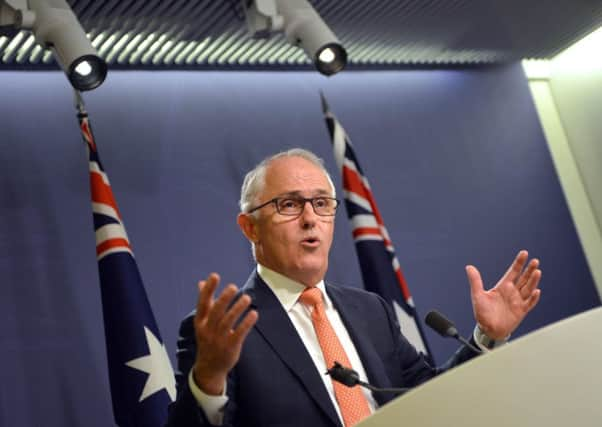Australian leader claims election win


Though the question of who won the July 2 election was answered, the question of exactly how the conservatives will rule the fractured Parliament was not. With official results still days or even weeks away, it was unclear whether Prime Minister Malcolm Turnbull’s Liberal Party-led coalition had won enough votes to govern in its own right, or whether it would need the support of independent and minor party lawmakers to form a minority government.
Either way, Turnbull faces a rough road ahead with a divided party, a splintered Senate and a politically weary public that has endured five changes of prime minister in as many years.
Advertisement
Hide AdAdvertisement
Hide AdThough millions of votes still need to be counted, there was no way for the opposition center-left Labour Party to win a majority of seats in the House of Representatives, where parties form governments. That prompted opposition leader Bill Shorten to formally concede the race, which in turn triggered Turnbull to announce that the coalition had won a second three-year term.
“We have resolved this election and done so peacefully,” Turnbull said.
Yet the election was not entirely resolved. Parties are required to hold at least 76 seats in the 150-seat House of Representatives to form a majority government, and the coalition has not yet reached that number. With around a quarter of the votes still left to be counted, the Australian Electoral Commission said the coalition was leading in 74 seats, the center-left Labour Party in 71 seats and minor parties and independents in five. It could take weeks to determine the final tally.
There are two possibilities: Either the coalition will form a majority government by a slim margin, or the country will have a hung Parliament. If that happens, Turnbull’s coalition will forge an alliance with independent and minor party lawmakers to form a minority government. Three independent lawmakers have already pledged their support to the coalition if such a situation arises.
Asked whether he thought his party would win a majority, Turnbull replied simply, “We’ve won the election.”
The coalition entered the race with a comfortable majority of 90 seats, and few had predicted it would suffer such steep losses. The result has raised the prospect that Turnbull could face a leadership challenge from colleagues unhappy with the party’s weak showing.
Even if Turnbull manages to hang onto his job, he has a slew of problems to contend with. The moderate leader needs to face the more conservative lawmakers in his party who are angry about his performance and upset that he ousted his predecessor, Tony Abbott, in an internal leadership ballot less than a year ago.
He will also need to deal with a fragmented Senate that could make it tough for him to pass laws. Though the final makeup of Parliament’s upper house is unlikely to be known for weeks, no party will win a majority of seats. That means even if Turnbull gets contentious legislation passed by the House, he would still have to try and strike deals with the opposition or a disparate group of Senate independents and minor parties to get it signed into law.